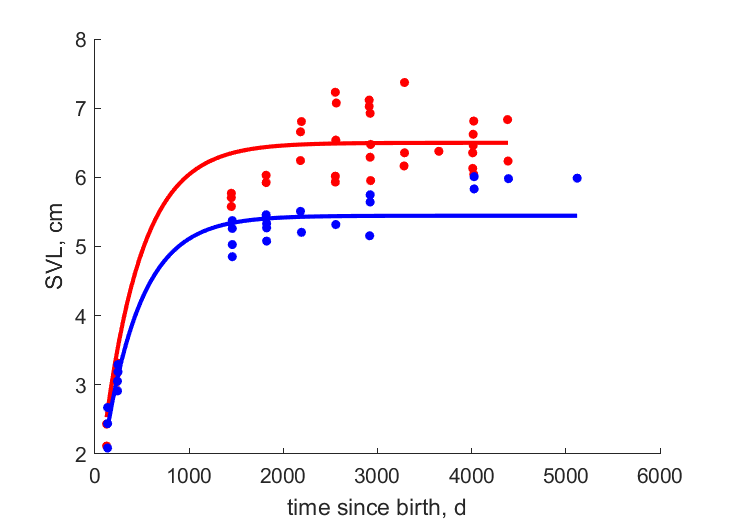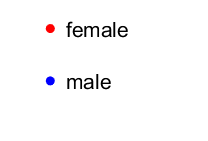Predictions & Data for this entry
| Model: std | climate: BSh | migrate: TT | phylum: |
| COMPLETE = 2.5 | ecozone: THp | food: biCi | class: |
| MRE = 0.073 | habitat: 0jFp, jiTh, jiFm | gender: Dg | order: |
| SMSE = 0.010 | embryo: Fh | reprod: O | family: |
Zero-variate data
| Data | Observed | Predicted | (RE) | Unit | Description | Reference |
|---|---|---|---|---|---|---|
| ab | 17.5 | 21.97 | (0.2553) | d | age at birth | FaraShar2016 |
| tj | 213.5 | 213.4 | (0.0003549) | d | time since birth at metamorphosis | FaraShar2016 |
| tp | 1460 | 1423 | (0.02553) | d | time since birth at puberty | FaraShar2016 |
| am | 4380 | 4875 | (0.113) | d | life span | FaraShar2016 |
| am_m | 5110 | 4595 | (0.1008) | d | life span | FaraShar2016 |
| Lb | 1.494 | 1.099 | (0.2646) | cm | length at birth | guess |
| Lj | 3.1 | 3.628 | (0.1702) | cm | length at metamorphosis | FaraShar2016 |
| Li | 7.5 | 7.429 | (0.009513) | cm | ultimate SVL | FaraShar2016 |
| Li_m | 5.5 | 6.223 | (0.1315) | cm | ultimate SVL | FaraShar2016 |
| Wwj | 1.5 | 1.425 | (0.05001) | g | wet weight at metamorphosis | FaraShar2016 |
| Ri | 0.411 | 0.4038 | (0.01752) | #/d | maximum reprod rate | FaraShar2016 |
Uni- and bivariate data
| Data | Figure | Independent variable | Dependent variable | (RE) | Reference |
|---|---|---|---|---|---|
| tL_f |   | time since birth | SVL | (0.06393) | FaraShar2016 |
| tL_m |   | time since birth | SVL | (0.04977) | FaraShar2016 |
Pseudo-data at Tref = 20°C
| Data | Generalised animal | Neurergus kaiseri | Unit | Description |
|---|---|---|---|---|
| v | 0.02 | 0.0855 | cm/d | energy conductance |
| p_M | 18 | 113.1 | J/d.cm^3 | vol-spec som maint |
| k_J | 0.002 | 0.002 | 1/d | maturity maint rate coefficient |
| k | 0.3 | 0.1294 | - | maintenance ratio |
| kap | 0.8 | 0.4874 | - | allocation fraction to soma |
| kap_G | 0.8 | 0.8003 | - | growth efficiency |
| kap_R | 0.95 | 0.95 | - | reproduction efficiency |
Discussion
- The data are from ambient temperatures which depend on the season. We use a standard temp of 15 deg C
- Males and females assumed to differ by {p_Am} only.
- mod_1: males have equal state variables at b, compared to females
Facts
- The sex of each mature individual was determined according to sexual dimorphism reported for this species: males have a fleshy protuberance at the base of the tail,whereas females have a prominent cloaca but without the protuberance (Ref: FaraShar2016)
Bibliography